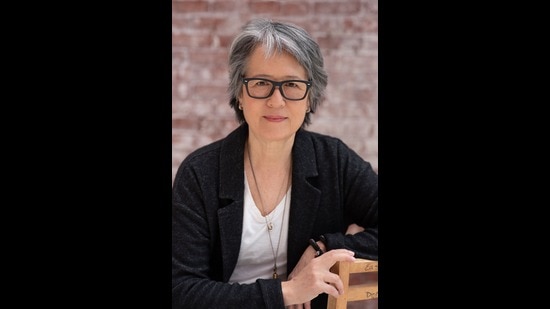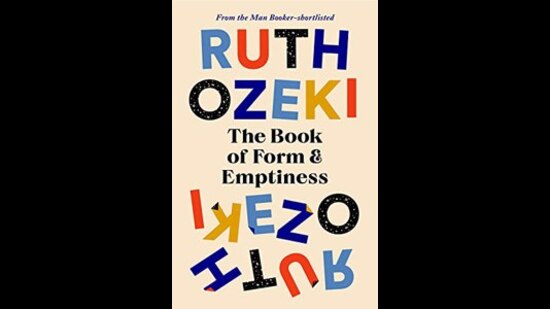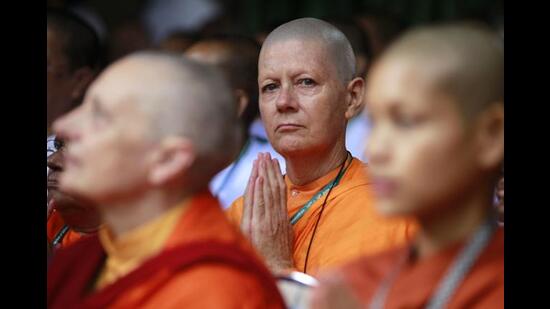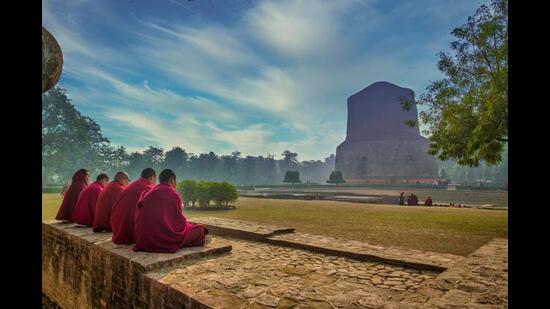Ruth Ozeki - “Artists and writers hear voices and see visions”
The film maker and author whose novel, The Book of Form and Emptiness, won the 2022 Women’s Prize for Fiction talks about being an academic and a Zen Buddhist priest and how it all informs her writing
As you prepare to be in India to speak at the Jaipur Literature Festival, what are some of the thoughts running through your mind? Have you been to Jaipur, or other parts of India before?

I am very excited! I have never been to Jaipur, but so many friends have told me about how beautiful it is. When I was a college student, I spent a year travelling through Asia. This included several months in India, visiting Calcutta, Varanasi, Agra, and Delhi. I was 19 years old then, so this was a very long time ago but I have never forgotten it. India made a tremendous impression on me, and I have wanted to return ever since.
Being a Zen Buddhist priest, do you plan to visit Buddhist sites in India, or will it be more of a literary pilgrimage than a spiritual one?
Both! When I was invited to the Jaipur Literature Festival, I decided to go a few weeks early and visit Sarnath, Bodhgaya, and Rajgir. I am meeting up with a group of college students on an academic exchange programme, studying at the Central University of Tibetan Studies in Sarnath. The programme is led by a colleague of mine, Professor Jay Garfield, who is a Buddhist scholar and teaches philosophy at Smith College. I have wanted to visit these historic Buddhist sites since I first started practising Zen seriously, so this is very exciting. The Jaipur Literature Festival is the biggest literary event of its kind in the world, so this trip combines both of the things I love best.
Your most recent novel, The Book of Form and Emptiness, takes its title from the Heart Sutra. Could you talk about the significance of this sutra for your practice as a novelist?
The phrase that we chant in the English translation of the Heart Sutra is “Form is not different from emptiness; emptiness is not different from form. Form itself is emptiness, emptiness itself is form.” This is a condensed expression of the central Mahayana Buddhist teachings of impermanence, no-self, and dependent co-arising or interbeing, which attempt to explain the causes of human delusion and suffering. So we can look at form and emptiness as a complex part of Buddhist philosophy, or we can see them simply as a description of our human experience and the truth of the world as it is.

Seen like this, these Buddhist teachings share a lot with fiction and literature. Both are expressions of the truths of the world. All stories are about the truth of impermanence. Stories start with change. Fictional characters resist change or try to manage it, dependently co-arising in relationship with each other, and this generates plot, which often leads to suffering and sometimes relief from suffering.
Buddhist philosophy explains reality, and fiction evokes it.
In this book, Benny seeks refuge in the silence of a public library where objects speak to him in whispers. To what extent is this character modelled after you, and based on your engagement with the teachings of Dogen? Were you aiming to de-pathologize ways of being that are termed as mental illness?
There are many ways of understanding the mind, and these days perhaps the primary lens through which we view the mind is that of biomedical psychology. But this biomedical model has limitations, since psychic conditions are not diagnosable in the way that, say, cancer is. Since there are no biomarkers for psychological “pathologies”, diagnosis is an inexact science. A person who tells her clinical psychologist that she hears voices will likely receive a diagnosis of psychosis or schizophrenia, but does voice hearing need to be pathological? Many people would say that it doesn’t.
Voice-hearing is an unshared psychic experience, and it is also a lot more common than we think. For about a year after my father died, I used to hear his voice calling my name. This was perplexing because I was hearing his voice as if with my ears, as if the sound was coming from outside my head, but it didn’t bother me, although it did make me feel sad. Eventually, I stopped hearing him, but this got me thinking about the phenomenon of voice hearing and the ways we view this unshared experience.
Artists and writers hear voices and see visions, and indeed we rely on them. As a novelist, I “hear” the voices of my characters and the voices of my books, and these voice-hearing experiences are also unshared, at least until I write the books.
And then there is the spiritual understanding of voice-hearing. The Bible is filled with prophets and voice-hearers. In Zen literature, there are many teaching stories that investigate questions like: Do insentient beings speak the Dharma? Can things, objects, pebbles, grasses, roof tiles, be our teachers? Can we learn to hear the wisdom of the insentient world?
So, I was thinking about all these ways of understanding the mind and mental and psychological phenomena, and the book is an expression of this musing.

In a recent interaction with the Smith College alumni book club, you spoke about how there are as many books of form and emptiness as there are readers because a new book comes into being every time a new person reads it. Does this insight come from the Buddhist theory of dependent origination or interbeing? How does it help you deal with criticism?
Yes, exactly! We think of “a book” as a singular entity, written by an author, but that’s not exactly accurate. Books are collaborations, arising from the interdependent relationship between reader and writer. As any writer knows, every person who reads a book brings his or her own lived experience to the page. This is what makes a book come to life. But it also means that the book one person reads is different from the book that her neighbour reads. Sometimes readers will ask me questions about an image or detail about a character, and I won’t recognize it at all! But I don’t mind because that reader was having her own experience, which is completely valid and has little or nothing to do with me. This is very helpful when it comes to criticism. If a critic loves the book or hates the book, I don’t really have to take it too personally.
As a novelist, you create fictional worlds. As a Zen practitioner, you train your mind to see things as they are. How do these two pursuits enrich and complicate each other?
As a Zen practitioner, I am aware of how the human mind perceives “things as they are” as stories. It’s our nature, and we can’t help ourselves. So, in the end, perhaps there’s not much difference. When I operate as a novelist, I make more of an effort to create my fictional worlds and construct them a bit more intentionally.
The two practices very much enrich each other, the only complication being that I can’t really type when I am sitting on the cushion.
After winning the 2022 Women’s Prize for Fiction, do you find yourself thinking more about what it means to be a woman writer today than say an American writer or a writer of Japanese heritage? How does Zen practice help you relate to all of these identities?
Winning the Women’s Prize meant a lot to me because throughout my life and my career, I’ve always supported and been supported by women and women’s institutions. That being said, I don’t really think about my authorial identity in these terms. I’m not saying that identity doesn’t matter. Gender, race, class, and all the combinations and permutations of these identities matter in the real world. But when I’m writing fiction, I’m immersed in the specificity of the characters’ lives and in the writing process itself, trying to find the right word or improve the clarity or the rhythm of a sentence.
Zen practice does help. The Buddhist teaching of no-self — that the feeling we have of being a concrete, individual self is an illusion — helps me hold myself and my identities a bit more lightly.
When you invite your creative writing students to explore meditation as a way of deepening their awareness before they write, do they embrace it as an adventure or express resistance because they see it as religious?
Mindfulness has become so mainstream and secularized in the USA that I don’t think many students would object on religious grounds. My students know in advance that mindfulness will be part of the class, too, so the ones who enrol know what they are getting into. And I always tell them they are free to choose not to meditate, too. Instead, they can just sit quietly with their eyes closed, so as not to disturb others, and since the meditations are guided, I think they get the benefit anyway. The sessions are short, never more than about ten minutes at the beginning of class, and most of them report that it helps their writing process tremendously.

How do you navigate the racism and misogyny that show up even in Dharma centres and sanghas that are meant to be egalitarian spaces for the benefit of all sentient beings?
One of the reasons that I decided to follow the priest path and ask for ordination is because I have such an ambivalent relationship with organized religion and am so critical of the way religious institutions have marginalized women. I think it’s important for women to be in leadership positions within these institutions, and I felt it would be interesting for me, personally, to work with my ambivalence from inside the belly of the beast.
Dharma centres and sanghas in the US have historically comprised two different types of practitioners: “immigrant” or “ethnic” Buddhists, and “convert” Buddhists. The latter has historically been middle-class and affluent white people, so much so that Buddhism in the US has been jokingly called the “Upper Middle Way”. Recently, though, I think this is changing. At least some of the sanghas that I work with are making a strong effort to diversify, and this is making a difference.
What are you currently working on?
Right now, not much. A short essay for the New York Times. The texts for some lectures that I’ll be giving next year. I haven’t started on a new novel yet, although I have some ideas. I am thinking that the next book I write will be non fiction, possibly a short memoir about writing and Zen, so your questions were timely and interesting!
Chintan Girish Modi is a freelance writer, journalist and book reviewer.
All Access.
One Subscription.
Get 360° coverage—from daily headlines
to 100 year archives.



HT App & Website







